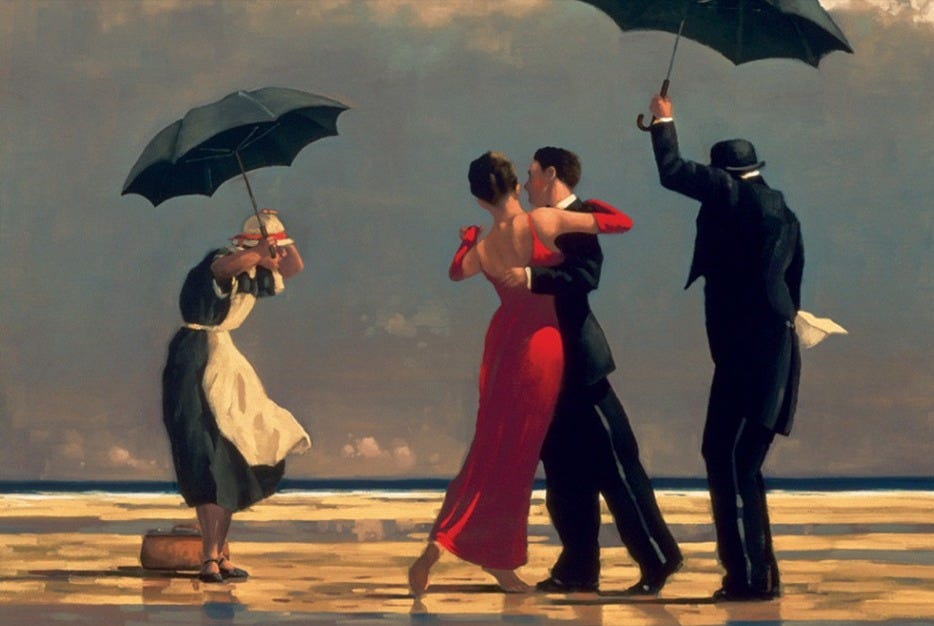it takes two to think
The richest source material for good work is conversation. I loved this Nature Biotechnology article by Itai Yanai and Martin Lercher (from which this post takes its name) which emphasizes the potency of two-person interactions for frontier scientific discovery, but more broadly, why any field benefits from the meeting of two electric minds:
An intelligent interlocuter can offer crucial additional benefits over a passive medium by exposing flaws in our reasoning, suggesting new directions of thought, or pointing out supporting or contradictory evidence…. mental breakthroughs are often achieved by escaping from an established habit of thought, a step that is much more easily taken if we engage our thinking with that of another.
Constructive conversation, the authors write, is akin to improvisational theatre. There is an art of building a scene that all players entertain. It is powerful to embed yourself into someone else’s realm of possibility. You can break through self-imposed hurdles or limitations when someone else challenges you: why do you think that way?
I reference the John O'Donahue concept of “eventive conversation” a lot. A good conversation is not two intersecting monologues, he says. Rather, you might overhear yourself saying things you never even knew and find words within you from places you imagined you had lost.
“If what he brings up is surprising, it’s worth dwelling on,” Daniel Kahneman, the beloved godfather of behavioral science, used to say about Amos Tversky. The pair were intellectual sparring partners that investigated systematic irrationality, eventually pioneering the field of behavioral economics. In Michael Lewis’ book about their friendship, The Undoing Project, they were described as temperamentally opposite yet surprisingly synergistic. Kahneman, shy and diligent; Tversky, gregarious and assertive. It was precisely through this inversion that each was able to break free of his own proclivities:
Amos was not merely an optimist; Amos willed himself to be optimistic, because he had decided pessimism was stupid. When you are a pessimist and the bad thing happens, you live it twice.
Other notable friendship pairings have resulted in generation-defining works of art and literature. J.R.R. Tolkien and C.S. Lewis met at a faculty meeting in Oxford and went on to become friends through a shared obsession of mythology and legend. In the late 1930s, they co-founded an informal literary group known as The Inklings, ideas from which formed some the world’s most timeless and significant works of fiction: The Lord of the Rings and The Chronicles of Narnia. Tolkien once wrote:
The unpayable debt that I owe to (C. S. Lewis) was not ‘influence’ as it is ordinarily understood, but sheer encouragement. He was for long my only audience. Only from him did I ever get the idea that my ‘stuff’ could be more than a private hobby. But for his interest and unceasing eagerness for more I should never have brought The Lord of the Rings to a conclusion.
Encouragement, another person’s dogged belief in you, can be important motivation for continuing difficult endeavors. I’d argue the most powerful form of advocacy is not just blind “support” but contextual affirmation: I fully grasp the complexity in the problem set, the boulder you’re pushing. Yet, I have full belief in your inevitability.
Parallel metamorphosis occurs where there is shared investment in the movement of another’s mind. We co-create personal artifacts. A pool of shared references: books, hosted events, ideas, grinning faces on my camera roll. I save the links you send because I admire your taste. I read your words because it’s like hanging out in your brain for a little bit. Does love demand intellectual companionship from us? I certainly think so.
It is terrifying to stand on the precipice of reciprocal change. We’re responsible for others, for the mutation to another that we can, and do, inevitably induce. All proximities become intimacies. Good ideas are contagious.
I am shaping your thoughts as much as you are shaping mine. It is a great responsibility to be able to alter someone’s internal model of reality in their brain. It is also a great pleasure to perpetually forge new ideas through a collaborative design process. Creativity then becomes less scary or daunting, more organic and inevitable.
It really does take two to think. We should be so lucky to find just one other person to think with and talk to. What draws individuals together still remains strange and inexplicable to me, but I’ve stopped questioning it: the feeling of the wall falling away. Each of us bears a great loneliness living inside of our own minds, but talking with you makes me feel less alone.
You might like some of my other essays on transformation, friendship, self-reckoning from this year ꩜
I read and really enjoyed Till We Have Faces by C.S Lewis this week, and finished All Fours (I would recommend reading Cecily Carver’s fantastic post for a more eloquent and succinct review, and what’s more: it is paired with Rabbit Run, an Updike novel which I have complex feelings about, aka detesting the narrator).
I’m a little slow on my reading pace as I’ve been quite social this holiday since returning to Asia, flitting around in the balmy heat catching up with friends over thick and gritty local coffee. Otherwise, I finished the first part of Squid Game 2 (gory, but…I couldn’t look away), Got The Marias song Cariño stuck in my head again.
Some quotes:
You are indeed teaching me about kinds of love I did not know. It is like looking into a deep pit. I am not sure whether I like your kind better than hatred. Oh, Orual—to take my love for you, because you know it goes down to my very roots and cannot be diminished by any other newer love, and then to make of it a tool, a weapon, a thing of policy and mastery, an instrument of torture—I begin to think I never knew you.
and
The complaint was the answer. To have heard myself making it was to be answered. Lightly men talk of saying what they mean. Often when he was teaching me to write in Greek the Fox would say, 'Child, to say the very thing you really mean, the whole of it, nothing more or less or other than what you really mean; that's the whole art and joy of words.'
A glib saying. When the time comes to you at which you will be forced at last to utter the speech which has lain at the center of your soul for years which you have, all that time, idiot-like, been saying over and over, you'll not talk about the joy of words.— Till We Have Faces
I have ambitions for the new year, including hosting more small dinner parties (my inspo: Yu & Mei, who also writes a fabulous fashion and lifestyle Substack, Meja, that is single-handedly responsible for my late-night scrolling of Ralph Lauren and Paloma Wool collections — Sasha Mei is sheer elegance. See her outfits.)
Here are some unsolicited winter recommendations:
This unbelievably soft and cozy lemon cardigan from Other Stories (like Sezane, but cheaper and still luxurious). They come in so many colors
This merino wool turtleneck. It is so chic and classy-sexy. Mind that it is slightly translucent so not for everyday wear, but perfect for a night out
Delicious smelling DS&Durga scents (you can try them out at Ministry of Scent in SF), and testing out Replica’s set K got me over the break
While I’m in Asia, I’m indulging in KBeauty and JBeauty picks like this rice mask and the famed mediheal toner pads
These extremely high-utility blue prism tinted Oakley visors. Admittedly I look like a biking dad while wearing them but they are such an essential for long runs or walks on the Embarcadero or in Golden Gate Park










Really enjoyed this. Personally, I feel that my best writing comes from good discussions. Intellect can truly be so symbiotic. Great piece.
Thanks for the mention of my "All Fours" piece! Rabbit, Run isn't a book I love (the protagonist really is awful) but it felt illuminating in this context.